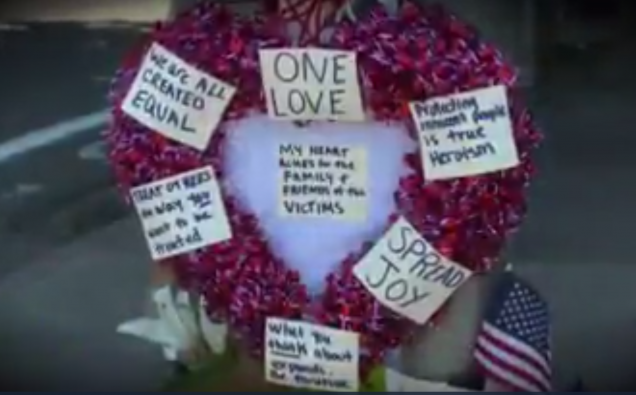
Oregonians in Portland laid flowers and held a vigil to express their sentiments over train stabbings on May 27, 2017. Photo Screenshot/KGW.com video
What happened on a train in Portland, Oregon, on Saturday was an American story of affinity and courage triumphing over hate. The three men, who stood up to anti-Muslim bias symbolized courage, affinity and love – an army veteran, a graduate and a poet.
It fell upon the shoulders of 53-year-old army veteran Ricky John Best, 23-year-old fresh graduate Taliesin Myrddin Namkai Meche, and 21-year-old poet Micah David-Cole Fletcher to rise against bigotry. In doing so, they presented an example of American steadfastness and commitment to the idea of protect their fellow citizens.
The three came to the aid of two teen-aged girls, who were being subjected to hateful slurs by 35-year-old Jeremy Joseph Christian, described in the media as a hardcore supremacist and admirer of Timothy McVeigh, the Oklahoma bomber, who killed more than 160 Americans.
But when the three tried to intervene, Christian reacted violently, assassinating Best and Meche and leaving Fletcher seriously injured with a knife, according to eye witness accounts.
The killings shook communities across the country, with an outpouring of support and praise for the heroism of three Americans.
Oregonians expressed their sense of loss and grief with flowers; friends and relatives paid tribute to the memory of the lives lost; and the media recounted qualities of the three men as “selfless and brave” citizens.
But it is the expressions of courage in the face of an excruciating sense of loss on part of the citizens and close friends and relatives that perhaps spoke more loudly for the American society – divided in the wake of anti-immigrant and anti-Muslim rhetoric during the 2016 election campaign.
The collective commitment of the people to values of inclusiveness, unity and respect for fellow citizens who look differently and follow a different faith will be America’s greatest moral weapon in the fight against bigotry and exclusionary thinking. The three brave heroes and their relatives symbolize these high civic and moral values – of love, pluralism and peaceful coexistence.
For instance, as reported by CNN, Meche’s sister said he was a compassionate young man.
“He was a hero and will remain a hero on the other side of the veil. Shining bright star I love you forever,” Meche’s mother Asha Deliverance, posted on Facebook.
Best, who retired from the Army in 2012 after a service that included deployments in Iraq and Afghanistan, was a father of four children.
“I’ve talked to most of his co-workers today, and several of them said it’s just like Rick to step in and help somebody out,” Kareen Perkins, his supervisor as technician, said.
As reported by The New York Times, in 2014 Best ran for a seat on the Board of Commissioners in nearby Clackamas County, where he lived with his family in the city of Happy Valley. According to his profile in The Oregonian, Best refused to accept campaign donations, and had decided to run upon a friend’s suggestion that instead of complaining about local politics he should go for an election.
“I can’t stand by and do nothing,” Best said, according to The Oregonian.
Similarly, Micah Fletcher, 21, who is being treated in a hospital with serious injuries, has always believed in fairness and equality of human beings. According to The Oregonian, Fletcher won a 2013 poetry competition with a poem against anti-Muslim prejudice.
His mother, Margie Fletcher, told CNN affiliate KATU that the attacker Christian’s knife missed Fletcher’s jugular by 1 millimeter.
“He’s in really bad condition,” she said. “I’m proud of him for standing up. I’m grateful that he’s here. It’s hard for me to say I want people to stand up, but two girls might be alive because of them.”
Of the two women Christian ranted against, one was wearing a hijab. The other, Destinee Mangum, 16, says she is not a Muslim.
“I just want to say thank you to the people who put their life on the line for me, because they didn’t even know me and they lost their lives because of me and my friend and the way we look,” Ms. Mangum told a FOX News affiliate, according to The New York Times.
“And I just want to say thank you to them and their family and that I appreciate them because without them, we probably would be dead right now,” she added.













